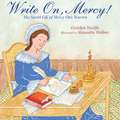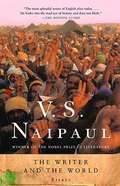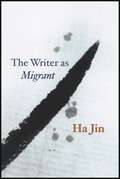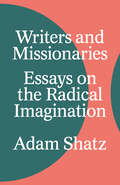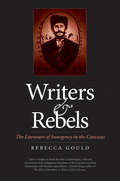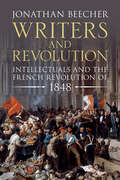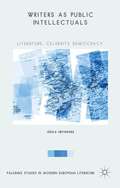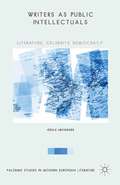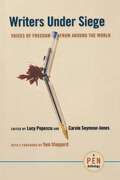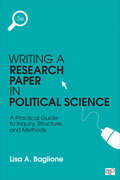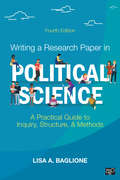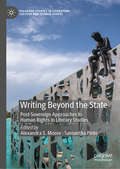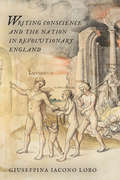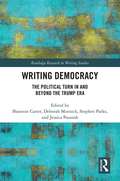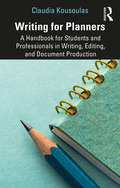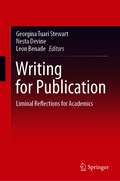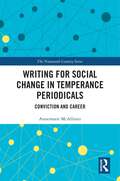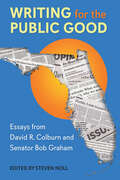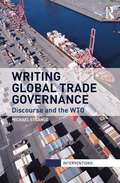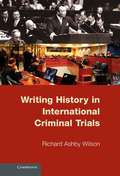- Table View
- List View
Write On, Mercy!: The Secret Life of Mercy Otis Warren
by Gretchen WoelfleGrowing up on Cape Cod, Massachusetts, Mercy Otis Warren was fortunate to go to school with her brother. When she married Patriot James Warren, Mercy wrote in secret—poetry, plays, and about the events of her time. She wrote of the people she knew, including George Washington and John and Abigail Adams. It wasn’t until Mercy was older that her literary life became known, with the publication of her three-volume history of the American Revolution.
The Writer and the World: Essays
by V. S. NaipaulSpanning four decades and four continents, this magisterial volume brings together the essential shorter works of reflection and reportage by the Nobel Prize-winning author. &“The most splendid writer…. He looks into the mad eye of history and does not blink.&” —The Boston GlobeV.S. Naipaul is our most sensitive, literate, and undeceivable observer of the post-colonial world. In these pages, he trains his relentless moral intelligence on societies from India to the United States and sees how each deals with the challenges of modernity and the seductions of both the real and mythical past.Whether he is writing about a string of racial murders in Trinidad; the mad, corrupt reign of Mobutu in Zaire; Argentina under the generals; or Dallas during the 1984 Republican Convention, Naipaul combines intellectual playfulness with sorrow, indignation, and analysis so far-reaching that it approaches prophecy. The Writer and the World reminds us that he is in a class by himself.
The Writer as Migrant
by Ha JinHa Jin's journey from an uneducated soldier in the People's Liberation Army in China to a resident of the United States raises questions about language, migration, and the place of literature in a globalizing world.
Writers and Missionaries: Essays on the Radical Imagination
by Adam ShatzWhat does it mean to be a politically committed writer?Through a close reading of the lives and works of some of the greatest intellectuals of recent times, Adam Shatz asks: do writers have an ethical imperative to question injustice? How can one remain a dispassionate thinker when involved in the cut and thrust of politics? And, in an age of horror and crisis, what does it mean to be a committed writer?Shatz interrogates the major figures of twentieth and twenty-first century thought and finds within their lives and work the roots of our present intellectual and geopolitical situation. Charting the role of the committed intellectual through the work of Jean-Paul Sartre on the Algerian War and Edward Said's lifelong solidarity with the Palestinian people, to Fouad Ajami's role as the "native informant" for pro-intervention cause in the lead-up to the invasion of Iraq, alongside philosophers and critics Roland Barthes, Jacques Derrida and Claude Lévi-Strauss and the novelists Michel Houllebecq and Richard Wright, each struggled to reconcile their writing and their politics, their thought and their commitments. Writers and Missionaries is an erudite and incisive work of intellectual elucidation and biographical enquiry that demands that we interrogate anew the relation of thought and action in the struggle for a more just world.
Writers and Rebels: The Literature of Insurgency in the Caucasus
by Rebecca Ruth GouldSpanning the period between the end of the Russo-Caucasian War and the death of the first female Chechen suicide bomber, this groundbreaking book is the first to compare Georgian, Chechen, and Daghestani depictions of anticolonial insurgency. Rebecca Gould draws from previously untapped archival sources as well as from prose, poetry, and oral narratives to assess the impact of Tsarist and Soviet rule in the Islamic Caucasus. Examining literary representations of social banditry to tell the story of Russian colonialism from the vantage point of its subjects, among numerous other themes, Gould argues that the literatures of anticolonial insurgency constitute a veritable resistance--or "transgressive sanctity"--to colonialism.
Writers and Revolution: Intellectuals and the French Revolution of 1848
by Jonathan BeecherThe revolution of 1848 has been described as the revolution of the intellectuals. In France, the revolution galvanised the energies of major romantic writers and intellectuals. This book follows nine writers through the revolution of 1848 and its aftermath: Alphonse de Lamartine, George Sand, Marie d'Agoult, Victor Hugo, Alexis de Tocqueville, Pierre-Joseph Proudhon, Alexander Herzen, Karl Marx, and Gustave Flaubert. Conveying a sense of the experience of 1848 as these writers lived it, this fresh and engaging study captures the sense of possibility at a time when it was not yet clear that the Second French Republic had no future. By looking closely at key texts in which each writer attempted to understand, judge, criticise, or intervene in the revolution, Jonathan Beecher shows how each endeavoured to answer the question posed explicitly by Tocqueville: Why, within the space of two generations, did democratic revolutions twice culminate in the dictatorship of a Napoleon?
Writers as Public Intellectuals: Literature, Celebrity, Democracy (Palgrave Studies in Modern European Literature)
by Odile HeyndersThis book demonstrates how authors performing the role of a public intellectual discuss ideas and opinions regarding society while using literary strategies and devices in and beyond the text. Their assumed persona thereby reads the world as a book - interpreting it and offering alternative scenarios for understanding it.
Writers as Public Intellectuals: Literature, Celebrity, Democracy (Palgrave Studies in Modern European Literature)
by Odile HeyndersThis book demonstrates how authors performing the role of a public intellectual discuss ideas and opinions regarding society while using literary strategies and devices in and beyond the text. Their assumed persona thereby reads the world as a book - interpreting it and offering alternative scenarios for understanding it.
Writers in Politics (Studies in African Literature)
by Ngugi Wa Thiong'OA collection of essays by Ngugi wa Thiong'o.
Writers Under Siege: Voices of Freedom from Around the World
by Carole Seymour-Jones Tom Stoppard Lucy PopescuThe freedom to write is under threat today throughout the world, with more than 1,000 writers, journalists, and publishers known to be imprisoned or persecuted in more than 100 countries. Writers Under Siege bears witness to the power and danger of the pen, and to the powerful longing for the right to use it without fear. Collected here are fifty contributions by writers who have paid dearly for the privilege of writing. Some have been tortured; some have been killed. All understand the cost of speaking up and speaking out.This book was prepared by PEN, which is both the world's oldest human rights organization and the oldest international literary organization. It commemorates PEN's eighty-fifth anniversary and celebrates PEN's work by giving voice to persecuted writers from around the globe. The contributors come from more than twenty countries, from Belarus to Zimbabwe. Many are well-known in the English-speaking world, including Orhan Pamuk, from Turkey, winner of the 2006 Nobel Prize for Literature; Harold Pinter, from England, winner of the 2005 Nobel Prize for Literature; Aung San Suu Kyi, from Burma, winner of the 1991 Nobel Peace Prize; and Anna Politkovskaya, from Russia, the noted journalist and author who was murdered in 2006, shortly after writing the piece that appears in this collection. Other contributors are less famous, perhaps, but their contributions are no less compelling. In prose and poetry, in fiction and non-fiction, they reveal the personal consequences of war, conflict, terrorism, and authoritarianism.While the pieces collected here differ in their settings and their subjects, all are riveting. Grouped into four sections -- Prison, Death, Asylum, and The Freedom to Write -- they call our attention to the fundamental humanity we share and highlight the inhumanity we can so easily condone.Contributors include: Chris Abani, Angel Cuadra Landrove, Asiye Guzel, Augusto Ernesto Llosa Giraldo, Mamadali Makhmudov, Orhan Pamuk, Harold Pinter, Anna Politkovskaya, Aung San Suu Kyi, Thich Tue Sy, Gai Tho, and Ken Saro-Wiwa.
Writing a Research Paper in Political Science: A Practical Guide to Inquiry, Structure, and Methods
by Professor Lisa A. BaglioneIn Writing a Research Paper in Political Science, author Lisa Baglione breaks down the research paper into its constituent parts and shows students precisely how to complete each component. The author provides encouragement at each stage and faces pitfalls head on, giving advice and examples so that students move through each task successfully. Students are shown how to craft the right research question, find good sources and properly summarize them, operationalize concepts, design good tests for their hypotheses, and present and analyze quantitative and qualitative data. Even writing an introduction, coming up with effective headings and titles, presenting a conclusion, and the important steps of editing and revising are covered. Practical summaries, recipes for success, worksheets, exercises, and a series of handy checklists make this a must-have supplement for any writing-intensive political science course. In this Third Edition, updated sample research topics come from American government, gender studies, comparative politics, and international relations. And now, more extensive materials are available on the web, including checklists and worksheets that help students tackle each step, calendar ideas to help them complete their paper on time, and a glossary.
Writing a Research Paper in Political Science: A Practical Guide to Inquiry, Structure, and Methods
by Professor Lisa A. BaglioneIn Writing a Research Paper in Political Science, author Lisa Baglione breaks down the research paper into its constituent parts and shows students precisely how to complete each component. The author provides encouragement at each stage and faces pitfalls head on, giving advice and examples so that students move through each task successfully. Students are shown how to craft the right research question, find good sources and properly summarize them, operationalize concepts, design good tests for their hypotheses, and present and analyze quantitative and qualitative data. Even writing an introduction, coming up with effective headings and titles, presenting a conclusion, and the important steps of editing and revising are covered. Practical summaries, recipes for success, worksheets, exercises, and a series of handy checklists make this a must-have supplement for any writing-intensive political science course. In this Third Edition, updated sample research topics come from American government, gender studies, comparative politics, and international relations. And now, more extensive materials are available on the web, including checklists and worksheets that help students tackle each step, calendar ideas to help them complete their paper on time, and a glossary.
Writing a Research Paper in Political Science: A Practical Guide to Inquiry, Structure, and Methods
by Professor Lisa A. BaglioneEven students capable of writing excellent essays still find their first major political science research paper an intimidating experience. Crafting the right research question, finding good sources, properly summarizing them, operationalizing concepts and designing good tests for their hypotheses, presenting and analyzing quantitative as well as qualitative data are all tough-going without a great deal of guidance and encouragement. Writing a Research Paper in Political Science breaks down the research paper into its constituent parts and shows students what they need to do at each stage to successfully complete each component until the paper is finished. Practical summaries, recipes for success, worksheets, exercises, and a series of handy checklists make this a must-have supplement for any writing-intensive political science course.
Writing a Research Paper in Political Science: A Practical Guide to Inquiry, Structure, and Methods
by Professor Lisa A. BaglioneEven students capable of writing excellent essays still find their first major political science research paper an intimidating experience. Crafting the right research question, finding good sources, properly summarizing them, operationalizing concepts and designing good tests for their hypotheses, presenting and analyzing quantitative as well as qualitative data are all tough-going without a great deal of guidance and encouragement. Writing a Research Paper in Political Science breaks down the research paper into its constituent parts and shows students what they need to do at each stage to successfully complete each component until the paper is finished. Practical summaries, recipes for success, worksheets, exercises, and a series of handy checklists make this a must-have supplement for any writing-intensive political science course.
Writing America: Language And Composition In Context AP* Edition
by David A. Jolliffe Hephzibah RoskellyWe have designed Writing America: Language and Composition in Context AP* Edition so that it can be used as the foundational text in a course that emphasizes reading, writing, and analyzing texts. Writing America teaches reading as a dynamic, interactive process. It teaches writing as a craft, related to reading, that produces rich, purposeful, well-planned and well-executed texts. It teaches the structure and organization of texts, at the level of both the whole text and the sentence. It couches this instruction in an examination of vitally important works of American literature, art, and culture, accompanied by a study of contemporary pieces that unpack current thinking on the issues and themes raised by the historical works.
Writing and the Ancient State
by Wang HaichengWriting and the Ancient State explores the early development of writing and its relationship to the growth of political structures. The first part of the book focuses on the contribution of writing to the state's legitimating project. The second part deals with the state's use of writing in administration, analyzing both textual and archaeological evidence to reconstruct how the state used bookkeeping to allocate land, police its people, and extract taxes from them. The third part focuses on education, the state's system for replenishing its staff of scribe-officials. The first half of each part surveys evidence from Mesopotamia, Egypt, the Maya lowlands, Central Mexico, and the Andes; against this background the second half examines the evidence from China. The chief aim of this book is to shed new light on early China (from the second millennium BC through the end of the Han period, ca. 220 AD) while bringing to bear the lens of cross-cultural analysis on each of the civilizations under discussion. The compiling of lists - lists of names, or of names and numbers - is a recurring theme throughout all three parts. A concluding chapter argues that there is nothing accidental about the pervasiveness of this theme: in both origin and function, early writing is almost synonymous with the listing of names.
Writing Beyond the State: Post-Sovereign Approaches to Human Rights in Literary Studies (Palgrave Studies in Literature, Culture and Human Rights)
by Samantha Pinto Alexandra S. MooreThis book investigates the imaginative capacities of literature, art and culture as sites for reimagining human rights, addressing deep historical and structural forms of belonging and unbelonging; the rise of xenophobia, neoliberal governance, and securitization that result in the purposeful precaritization of marginalized populations; ecological damage that threatens us all, yet the burdens of which are distributed unequally; and the possibility of decolonial and posthuman approaches to rights discourses. The book starts from the premise that there are deep-seated limits to the political possibilities of state and individual sovereignty in terms of protecting human rights around the world. The essays explore how different forms, materials, perspectives, and aesthetics can help reveal the limits of normative human rights and contribute to the cultural production of new human rights imaginaries beyond the borders of state and self.
Writing Conscience and the Nation in Revolutionary England
by Giuseppina Iacona LoboExamining works by well-known figures of the English Revolution, including John Milton, Oliver Cromwell, Margaret Fell Fox, Lucy Hutchinson, Thomas Hobbes, and King Charles I, Giuseppina Iacono Lobo presents the first comprehensive study of conscience during this crucial and turbulent period. Writing Conscience and the Nation in Revolutionary England argues that the discourse of conscience emerged as a means of critiquing, discerning, and ultimately reimagining the nation during the English Revolution. Focusing on the etymology of the term conscience, to know with, this book demonstrates how the idea of a shared knowledge uniquely equips conscience with the potential to forge dynamic connections between the self and nation, a potential only amplified by the surge in conscience writing in the mid-seventeenth-century. Iacono Lobo recovers a larger cultural discourse at the heart of which is a revolution of conscience itself through her readings of poetry, prose, political pamphlets and philosophy, letters, and biography. This revolution of conscience is marked by a distinct and radical connection between conscience and the nation as writers struggle to redefine, reimagine, and even render anew what it means to know with as an English people.
Writing Democracy: The Political Turn in and Beyond the Trump Era (Routledge Research in Writing Studies)
by Shannon Carter Deborah Mutnick Jessica Pauszek Steve ParksWriting Democracy: The Political Turn in and Beyond the Trump Era calls on the field of writing studies to take up a necessary agenda of social and economic change in its classrooms, its scholarship, and its communities to challenge the rise of neoliberalism and right-wing nationalism. Grown out of an extended national dialogue among public intellectuals, academic scholars, and writing teachers, collectively known as the Writing Democracy project, the book creates a strategic roadmap for how to reclaim the progressive and political possibilities of our field in response to the "twilight of neoliberalism" (Cox and Nilsen), ascendant right-wing nationalism at home (Trump) and abroad (Le Pen, Golden Dawn, UKIP), and hopeful radical uprisings (Black Lives Matter, Occupy Wall Street, Arab Spring). As such, the book tracks the emergence of a renewed left wing in rhetoric and activism post-2008, suggests how our work as teachers, scholars, and administrators can bring this new progressive framework into our institutions, and then moves outward to our role in activist campaigns that are reshaping public debate. Part history, part theory, this book will be an essential read for faculty, graduate students, and advanced undergraduate students in composition and rhetoric and related fields focused on progressive pedagogy, university-community partnerships, and politics.
Writing for Planners: A Handbook for Students and Professionals in Writing, Editing, and Document Production
by Claudia KousoulasWriting is never easy, but this book can make it easier. With attentiveness and experience, Claudia Kousoulas gives readers applied writing, editing, and production approaches that provide a clear path to completing a document and tools that ensure it is engaging and professional. The book follows a project’s path from initial assignment and conception, through sorting out what’s significant, shaping it into a message, and guiding readers to an action. It addresses the different types of documents planners have to create, the different media they use, and the different audiences they address. Its strategies will help writers start a project and see it through to a clear and coherent piece of work that serves its purpose. This book will help planners meet the challenges of creating work that is accurate, creative, and useful. Students will find it helpful in providing professional standards and quick reference information, and professionals will carry it through their careers as a reference, and as a way to establish workplace standards and improve their own work.
Writing for Publication: Liminal Reflections for Academics
by Leon Benade Georgina Tuari Stewart Nesta DevineThis book focuses on academic writing and how academics who are experts in their fields can translate their expertise into publishable form. The magnitude and speed of the changes that are transforming the global academic landscape produce an ongoing need for literature that interprets the nature of academic work. This book arises from the background discipline of Education, which is a relatively new university subject that draws on the entire knowledge spectrum from the fine arts to the natural sciences. Each chapter addresses an aspect of the conditions of written academic labour in an age of digital publishing: its nature, how it works, and guidance for successful navigation. This book will provide helpful guidance to graduate students, researchers and teachers in universities and higher education, who are united by the challenges of this new world of academic publishing.
Writing for Social Change in Temperance Periodicals: Conviction and Career (The Nineteenth Century Series)
by Annemarie McAllisterThis book suggests alternative ways of looking at what made a writer, what people gained from writing, and explores the alternative world of temperance periodicals of the nineteenth and early twentieth century. It introduces some of the now-forgotten writers who, in their thousands, kept the Victorian periodical presses rolling, and the public entertained. Locating their writing in the context of their personal commitment, the study takes seven prolific writers who were outside what we now think of as the circuits of conventional publication and authorship, and looks at how they found ways to make their voices heard. Their absorption in a cause led them to forge impressive writing careers in a variety of genres and media, focusing around high-circulation temperance periodicals. Examining their cultural contributions as well as their professional lives confirms the importance of the temperance movement in the second half of the nineteenth century, and raises questions about distribution practices and values, and distinctions between ‘life’ and ‘work.’
Writing for the Public Good: Essays from David R. Colburn and Senator Bob Graham (Government and Politics in the South)
by David R. Colburn Bob GrahamInsights into modern American politics and society from two of Florida’s most influential public figures Writing for the Public Good presents a selection of over 100 important opinion pieces from David R. Colburn (1942‒2019) and Senator Bob Graham, two of the most influential public figures in contemporary Florida. Spanning 30 years and addressing a wide variety of topics that continue to be relevant today, these essays show the key role of Florida in modern American life and politics and illustrate the power of civic engagement in tackling issues facing the nation.Exemplifying public writing that connects with and informs readers everywhere, these pieces appeared as op-eds in outlets including the Miami Herald, the Tampa Bay Times, the Tampa Tribune, the Orlando Sentinel, the New York Times, the Washington Post, Politico, and Time. With style, intelligence, and thoughtfulness, Colburn and Graham examine subjects including the economy, race relations, public education, the environment, national intelligence, and international affairs. They look to history to give context to the social problems of today, and they point forward to constructive solutions that center on the role of citizen activism.Together, these essays chart the history of modern Florida, reflecting the state’s rise to a Sunbelt powerhouse that is often at the center of national conversations. Colburn and Graham challenge readers to consider and discuss different perspectives on current issues and, above all, to respond. Readers will come away with renewed hope that their actions can make a difference to improve society and will be inspired to work for a better tomorrow.A volume in the series Government and Politics in the South, edited by Sharon D. Wright Austin and Angela K. Lewis-Maddox
Writing Global Trade Governance: Discourse and the WTO (Interventions)
by Michael StrangeWriting Global Trade Governance operationalises a key post-structuralist methodology in order to expand understanding on the institution at the heart of the global political economy. Despite the WTO’s centrality and the growing popularity of methods utilizing discourse theory, no other text has yet demonstrated how these two fields of learning can be productively combined. The book seeks to move beyond existing literatures that assume the WTO to be a structure, institution or normative framework, in order to enquire into the discursive processes of identity formation that make the WTO both possible and contested. The book criticises conventional approaches that treat critical civil society as distinct to the WTO, arguing instead that it is only through including such social practices within the field of relations making the WTO that we can properly understand what makes the WTO work. The book presents an empirical analysis of the discursive character of the present-day WTO (including its formation and operation) and then moves on to evaluate how it is subject to change within a broader social context. The final stage of the book seeks to discuss the impact of the findings on future research, both on the WTO and other institutions. This work is a significant intervention in the literature on the World Trade Organization and the politics of global trade and social movements, and will be of great interest to students and scholars of global governance, discourse theory and international organizations
Writing History in International Criminal Trials
by Richard Ashby WilsonWhy do international criminal tribunals write histories of the origins and causes of armed conflicts? Richard Ashby Wilson conducted research with judges, prosecutors, defense attorneys and expert witnesses in three international criminal tribunals to understand how law and history are combined in the courtroom. Historical testimony is now an integral part of international trials, with prosecutors and defense teams using background testimony to pursue decidedly legal objectives. In the Slobodan Milošević trial, the prosecution sought to demonstrate special intent to commit genocide by reference to a long-standing animus, nurtured within a nationalist mindset. For their part, the defense called historical witnesses to undermine charges of superior responsibility, and to mitigate the sentence by representing crimes as reprisals. Although legal ways of knowing are distinct from those of history, the two are effectively combined in international trials in a way that challenges us to rethink the relationship between law and history.
